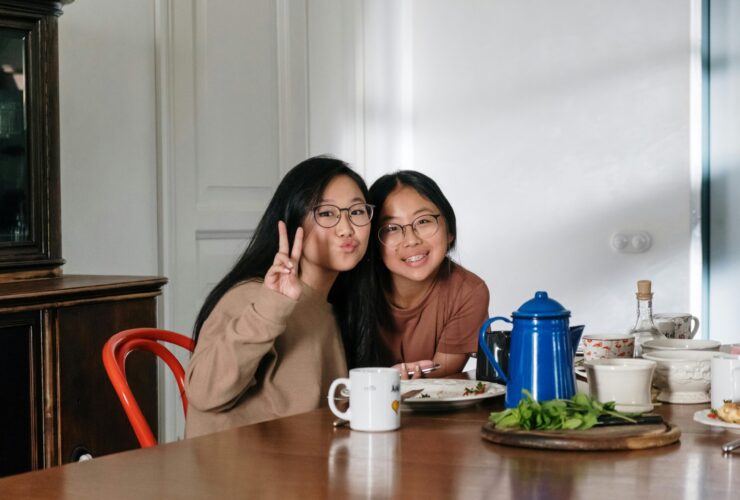Entering new parenthood comes with a range of joys and stressors. Anyone who knows a new mom can understand that this journey can be challenging. It is no walk in the park for any new mom to navigate the new demands of a baby or toddler. Plus, there are many identity changes that arise in the early years of parenthood. When you add in the unique experiences of being an Asian American woman, new parenthood can significantly, and negatively, impact a mom’s mental health and wellbeing. In this blog, we’ll consider six reasons parenthood might feel more challenging for an Asian American mother.
1) You may feel like a failure even if you “have it all.”

Asian American mothers who identify as 1st or 2nd generation immigrants have to navigate the cultural expectations of motherhood in both Eastern and Western cultures. In many Asian cultures, traditional gender roles and collective values are expected. So, motherhood can play a central role for women. Mothers are often pressured by extended families and spouses to make career sacrifices for the new arrival in the family. Additionally, women are often assumed to be the primary caregiver for the child following birth. This can conflict with Western expectations of independence and career pursuits. Many American women are expected to work as well as fulfill motherly duties. Familial expectations and societal standards (e.g., model minority myth) can add even more pressure on women to excel in their careers. It can feel difficult to juggle excelling as a professional while also excelling as a “devoted” mother.
As such, Asian American mothers can experience significant tensions in navigating the balance of career and family life. This tension can leave many moms feeling like they are not good enough no matter what they do. In t urn, this can negatively impact self-esteem and put Asian American moms at greater risk of developing mood disorders following childbirth.
2) You may need to work hard to stay connected to your language and culture.
Asian American mothers who do not speak English fluently may find it especially difficult and stressful to navigate the many organizations and systems involved in childhood. This can include daycares, preschools, and schools. Conversely, those who speak English fluently but are not as confident in their languages of origin can struggle to pass on both languages to their children. For example, a 2nd-generation Malaysian American mom who grew up surrounded by white mainstream culture may not feel equipped and comfortable teaching her children Malay and other aspects of her heritage.
Even with the best intentions to pass down Asian language and culture, it can be difficult to teach children to achieve fluency and confidence, due to the lack of exposure and resources in their environment.
In mixed-racial or multicultural families, this can be tricky and require additional effort and resources. especially tricky. For example, in the case of a Taiwanese and Filipino family living in the U.S., parents will have to navigate passing down multiple languages. This can be especially challenging in an environment that may not speak these languages.
Language is a conduit of culture. Intergenerational erosion of language means that the next generation may have difficulty connecting with the previous generations’ values, philosophies, and even people (e.g., grandparents). This cultural gap between generations may bring up painful issues of identity and legacy for moms. This loss of identity and culture from on generation to the next may be especially painful for immigrant mothers. Asian American mothers can experience feelings of grief, anger, frustration, fear, anxiety, confusion, loss, and sadness.
3) You may experience more intergenerational family conflict.
Asian American mothers must contend with differences in cultural values between themselves, their parents, and their children. The generation in which the family immigrated can further add to these cultural differences. First-generation Asian American families may hold to specific traditions, practices, and subcultural values. These can be very different from second-generation or third-generation families. For example, the grandparents of a family who immigrated may hold strong religious values tied to the culture of their homeland. But these may not have been passed down to their children due to the need to assimilate into the mainstream culture. Now that their children are parents themselves, the grandparents may pressure them to pass on these religious values to their grandchildren.

As another example, Asian American mothers who immigrated may be unfamiliar with the cultural landscape in which their children grow up. Their childhood environment may have been entirely different from their children’s. There may be hopes or expectations for their children to hold similar values and maintain certain cultural practices. And there may be disappointment when their children reject or deny these values and practices. The hope of previous generations to pass on cultural values to future generations can cause stress, tension, and conflict between family members. On top of the stress of raising a child, this intergenerational family conflict can feel impossible to navigate.
4) You may feel overwhelmed by the bicultural choices of new motherhood.
For Asian American mothers, the journey of pregnancy, childbirth, postpartum, and each of the baby’s milestones may involve more planning and conscious choice. In trying to navigate both Asian and American cultural expectations, new moms may feel this added pressure and stress. For example, if you’re Chinese American, will you choose to have a proper zuo yue zi (sit-month) experience in your postpartum? If you choose to eat the traditional meals offered to new moms in China, are there businesses that support these postpartum needs near where you live? As a Korean American, will you plan a Doljabi for your baby? Or perhaps, will you feel the pressure to avoid traditional Asian practices in favor of other Western practices that feel more socially comfortable and accessible?
Sometimes, even moms who aspire to stay more connected to their cultural traditions can feel lost as to how best to proceed. They may feel even more lost if they have not witnessed or experienced these traditions for themselves. For example, a biracial Indian American mom wanting to get more in touch with her Indian heritage may find it difficult to access these traditions. The plethora of choices, and the conflicting advice from different people around the new mom, can feel overwhelming, exhausting, and stressful.
5) You may find it hard to get childcare help from your family.
When people immigrate to the U.S. from Asian countries, they enter into an individualist society and leave behind a collectivist society. Childcare is seen as an individual family problem in the West. However, child-rearing is consider a whole extended family problem in the East. For generations in Asian countries, large families supported the growth and development of young children. It was common for in-laws, grandparents, aunts, and uncles to help lighten the childcare burden on mothers alone. In the U.S., childcare plans and decisions fall primarily on the individual family unit. Most commonly, it falls on the mother alone. Even if you would like extended family support, they may not be able to offer it.
This isolation can not only add a significant amount of stress, but also create a sense of grief and loss for her children, who do not get to grow up surrounded by family. For example, American-born children of immigrants (who otherwise would have grown up with grandparents, aunts, uncles, and cousins nearby) may only grow up with siblings in their nuclear family system in the U.S. Extended families, if they immigrated at all, might not be close. They might be the only ones family living in their state. As a result, Asian American families can feel a lot smaller and more distant in the U.S. than in their country of origin.

While first-generation Asian immigrant parents may not have access to extended family childcare, second-generation Asian parents may find that family conflicts and differing cultural values make paid childcare seem more attractive.
Even with grandparents who hold cultural values of helping out with childcare, second-generation Americans may not hold similar cultural expectations for extended family childcare and may find that it is more stressful to rely on them. For example, grandparents may inadvertently add pressure on the parents to raise their children in a certain way. The parents may not want to have to fight those cultural battles while they’re juggling childcare duties. The lack of supportive structure, the differences in culture, and the pressure to handle childcare single-handedly can make it especially stressful for Asian American mothers who must navigate new parenthood without the support previous generations may have had. These stressors can trigger feelings of helplessness, hopelessness, grief, and anxiety.
6) You may feel alone, judged, and unsupported if you do have mental health issues.
Due to the stigma associated with mental health issues in many Eastern cultures, many Asian families can be dismissive when it comes to mental health challenges faced by family members or even community members. As a result, it can be especially isolating and shaming for Asian American mothers suffering from postpartum anxiety and/or depression to gain support from family members during this particularly sensitive period in their lives. This can exacerbate any existing symptoms and further alienate new moms, which can worsen their overall mental health outcomes.
Interested in Therapy with an Asian American Therapist in Los Angeles and New York?
If you are a mom facing some of these challenges, speaking to a trained Asian American therapist can help you process all of your difficult feelings in this complicated chapter of your life. Our culturally sensitive therapists can help you navigate the unique factors you are experiencing. You deserve to feel heard, understood, and supported, and to feel confident as you move through this parenting journey. To get started with individual therapy sessions at our Los Angeles-based therapy practice, follow the steps below.
- Fill out the contact form to get connected with us.
- Get matched with a skilled Asian American therapist.
- Process the challenges of parenthood and start feeling more empowered
Postpartum Mom Art Support Group
Find community and healing in your postpartum challenges as an Asian American mother in our Postpartum Mom Art Support Group.
Learn more about the support group here. No art experience required – all skill levels welcome!
Other Services at Yellow Chair Collective
There are many options for treatment using online therapy in California and New York, it just depends on what you’re needing. And while we certainly service Asian American folks, we also work with individuals from other cultures, too. So, whether you need support in overcoming anxiety, burnout, trauma, or PTSD, we can help. Likewise, we serve teens and couples in need of support, too. So when you start online therapy with us, you can bring your whole self, including past struggles, cultural impacts, and more.






